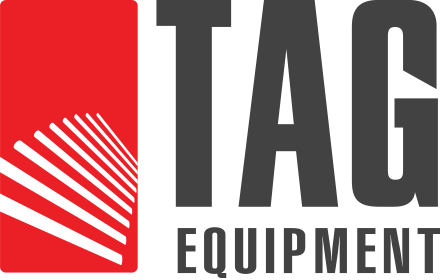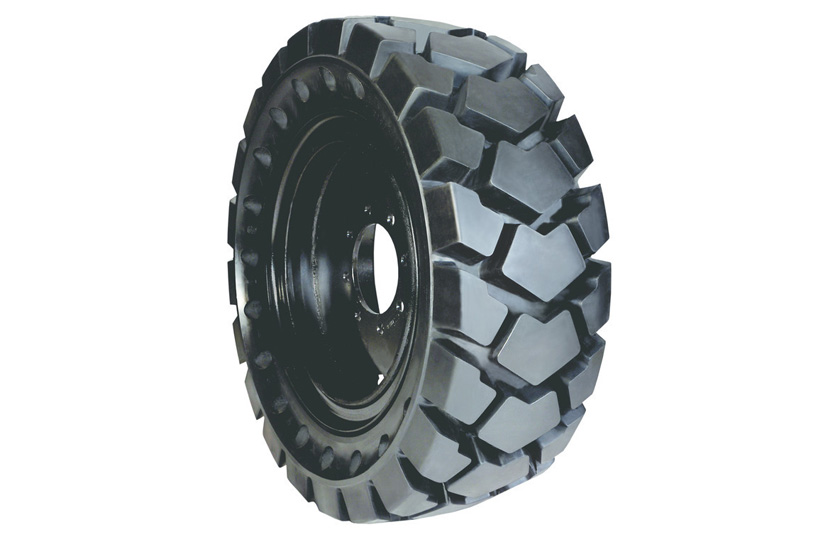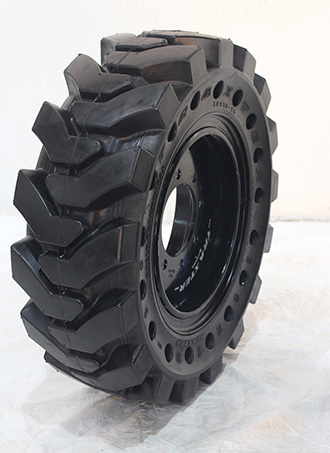When it comes to skid steer attachments, parts and accessories, tires are typically one of the most critical performance features. Whether you are an experienced professional or new to the construction tire industry, it pays to have some basic knowledge of tire technology and maintenance to ensure they last long. We’ve put together this detailed guide to using skid steer tires, including the fundamentals of solid tires and flat-proof tires, technologies, different brands such as Solideal, Traxter, and Camso, tips on maintenance, and preventive measures to help you make an informed decision.
Table of Contents
The Fundamentals of Skid Steer Tires
3 Requirements When Looking for a Tire Solution
- Tire Size
Tire dimensions tend to vary with machine size, make, and model. It helps to have these details handy when buying a new tire or a replacement skid steer tire. - Tire Design
To choose the right design for your tires, it helps to understand your application and the ground conditions, including how severe or soft it is. - Tire Construction
Each tire construction has different benefits. Whether you’ll need solid tires, flat-proof tires, foam-filled or no air skid steer tires will depend on your equipment and application, work hours, and overall usage.
Information on the Sidewall of Your Tire
The sidewall of a tire typically has all the essential details such as:
- Brand, product name, and tire type
- Serial number
- Tire size
- Load and Inflation indications
- Safety procedures
Tire Size for Replacement Tires
When it comes to choosing replacement skid steer tires, it helps to use OEM-recommended sizing. You may consider suitable equivalences if OEM sizes are not available.
Tire Ratings
- Star Rating (SR) – is for radial tires.
- Ply Rating (PR) – applies to bias-ply tires.
These ratings can help you determine the relative strength of the tire construction. It helps to remember that the higher the SR or PR, the heavier loads the tire can withstand.
Load Index (LI) & Speed Symbol (SS)
LI refers to a standardized load capacity for tires and denotes the load a tire can carry at a particular speed.
SS represents this speed. Some construction tires may have more than one speed symbol for the same load index. This is why it helps to consider both LI and SS when choosing a tire for your skid steer.
Skid Steer Tire Technologies
Bias Tires & Radial Tires
| Bias Tires | Radial Tires |
|---|---|
| A bias or diagonal tire consists of crossed nylon sheets. | A radial tire has a metal belt and a flexible carcass arranged radially. |
| They are more affordable, have more sidewall puncture resistance, and provide better stability. | They last long, offer better tread impact resistance, ride quality, heat resistance, and more traction. |
Solid Tires
Bias and radial tires are inflated with air and are typically considered pneumatic tires. Solid tires are ideal for extreme applications and heavy-duty work with high puncture risks because they have rubber compounds in them. You can use them to work on scrapyards and waste or recycling projects. If you use them correctly, solid tires can be maintenance-free.
Tread Patterns
- The Direction of the Pattern
Choosing the tire with the right design can enhance the overall equipment performance depending on the ground condition. While zigzag type, non-directional patterns offer better performance for hard or mixed grounds, directional lug type tread patterns are more suitable for soft surfaces. - Lug-to-Void
It helps you get the right pattern for your job. A 100% lug tire or smooth tread will offer great wearing performance. However, it tends to slip on surfaces other than on asphalt or dry concrete. - Lug or Original Tread Depth (OTD)
It is a good indicator of the overall life performance of the tires. You should consider this aspect if you are planning to work on muddy grounds and other soft surfaces.
Skid Steer Tire Maintenance
Inflation Pressure (IP)
IP is an essential aspect because it impacts tire wear. Be sure to use the recommended inflation pressure according to the application, load capacity, and speed. This will help optimize the overall performance and life of the tire. Also, regularly check the IP to minimize safety risks and increase uptime.
Extending Tire Life
Whether you have solid tires, flat-proof tires, or prefer Traxter tires, Camso tires, or tires by any other manufacturer, here are six tips to help enhance their life:
- Choose the right tire for your usage and specific application.
- Avoid mixing different tread depths, patterns, and constructions.
- Consider inflation pressure and speed and load recommendations.
- Examine inflation pressure regularly.
- Inspect your tires after each use and remove rocks, debris, and more from between the lugs.
- Rotate your tires regularly.
Minimize Skid Steer Tire Wear
- Make sure you know how long the tires will last depending on the severity of the job, traction required, and surface type.
- Understand the factors that lead to tire wear, including the operator’s control and uncontrollable aspects such as ground conditions.
- Learn to read your tires. Look for any signs of damage and recognize the cues that indicate whether you need to repair or replace them.
Tips for Construction Users
- Be sure to deal with a reliable and reputable local dealer such as Tag Equipment for all your skid steer tire needs.
- Identify which of the performance factors are essential for optimizing their performance and minimizing the operating expense.
- Maintain detailed records to determine the overall cost per hour.
- Follow a proper tire inspection and maintenance program. The experts at Tag Equipment can also guide you with this.
- Do not base your decision solely on price. It helps to remember that choosing the cheapest tires is not always the best or most effective solution.
Why are Flat-Proof or Solid Tires a Great Option?
Flat-proof tires or solid tires for Bobcat and other makes of skid steers come with a variety of benefits, including:
- Durability
- Better equipment stability
- Puncture resistance
- Reduced downtime
- Less overall maintenance
- Use in many applications
- Use in more extreme applications
Brands of Solid & Flat-Proof Tires at Tag Equipment
We carry an extensive range of skid steer tires for all makes and models, including the following:
- Traxter (Made by Trident), one of our top-selling brands.
- CAMSO
- Galaxy
- PrimeX
Our Selection of Traxter Solid Tires
- Traxter (Made by Trident) HD
They are durable because they have the highest quality synthetic and natural rubber compounds. With deep tread, built-in cushion ride, and mud breakers, these flat-proof tires offer better performance than similar pneumatic tires even in the most demanding environments. They are more suitable for hard surface applications. - Traxter (Made by Trident) R4
Traxter R4 flat proof tires are made to ensure long life and durability. They come with mud breakers, deep tread, and built-in cushion ride and are typically preferred for dirt and mud applications. - Traxter (Made by Trident) Smooth
Smooth solid skid steer tires comprise high-quality rubber compounds. They are ideal for scrap applications and hard surfaces where mud traction is not needed. They provide long wear and reduced downtime.
Industrial Applications of Solid Tires
- Paving
- Demolition
- Scrap or waste facility
- Concrete asphalt restoration
Frequently Asked Questions About Solid Tires
What is a Solid Rubber Tire?
Solid tires are typically rolled in thin layers of rubber onto a metal frame mount and can be mounted on a specific vehicle. This hardens the form, enhances the durability, and makes the rubber hold.
How Long Do Solid Tires Last Compared to Pneumatic Tires?
Our solid tires by Traxter are made using cut resistant compounds and come with sidewall apertures for ride comfort. They are 100% flat-proof and require minimal maintenance. They can last up to 5 times longer than pneumatic tires.
How Do You Mount Solid Skid Steer Tires?
The easiest way to mount a solid tire is by pressing on it to fit onto an existing rim. You can use specialized equipment or get it done at a local tire dealer who has a press for this purpose.
Where Can I Find the Size of My Flat-Proof or Solid Tire?
You can find the tire size on the sidewall or from the VIN plate. If you can’t determine it this way, you may contact us with this information, and we can provide further assistance.
Can Tag Equipment Help Me Select the Right Tire?
At Tag Equipment, we have experts who are well-versed in solid skid steer tires, including flat-proof tires, no air skid steer tires, and more. We carry all products by major brands, including Solideal tires, Traxter tires, and more. We will be happy to assist you in finding the right tires for your specific application.
When Should I Replace My Skid Steer Tires?
Regular inspection should indicate when you should replace the tires of your skid steer. If it shows signs of cracking, has damaged tread, or is missing chunks, you may need to replace it. Also, look out for debris in the tread and gouges and cuts along the sidewall.
How Long Do Skid Steer Tires Last?
Skid steer tires’ longevity typically depends on a variety of aspects, including the quality of material, usage conditions, operator’s skills, maintenance routine, and more.
Contact Us for Solid Tires, Bobcat Tires, Flat-Proof Tires & More
Tag Equipment has an extensive selection of high-quality skid steer tires, including Solideal tires, Traxter tires, and more.
We have professionals to help you find the right product that meets your needs. For more details about our inventory, call us at 416-716-5850 or fill out our online contact form.
You might also want to check our related posts:


